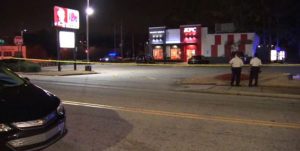
Atlanta Fast-Food Restaurant Parking Lot Shooting Leaves Two People Injured. (WSBtv.com)
Did negligent security contribute to the shooting at an Atlanta fast food restaurant and are justice and compensation available to the victims? Read Our Legal Take below to find out what legal options are available.
LOCAL NEWS
Gunfire erupted outside an Atlanta, Georgia fast food restaurant Sunday night, January 12, 2020, leaving two people injured.
As reported by 11Alive.com, “[t]he shooting happened at 3604 Bakers Ferry Road in the heart of the city’s Adamsville neighborhood.”
According to the report, “upon arriving at the scene in response to a “person shot” call, [police] found the two victims.”
WSBtv.com is reporting, “[p]olice found a man who had been shot in the head and a woman who was shot in the leg. Both were taken to Grady Memorial Hospital.”
According to the report, “the couple was in a car when two men walked up and shot into the car multiple times.”
The investigation is ongoing.
OUR LEGAL TAKE
Restaurant patrons have a right to feel safe and secure while on the premises. The level of security provided at the restaurant is of significance, and is a relevant consideration when analyzing whether this shooting may have been prevented. The following questions are also important in assessing whether this incident may have been avoided:
- What security measures were in place to deter crime and protect the victim at the time of the shooting?
- Have there been prior incidents of violence on or near the the property, and, if so, were any security measures added after any prior incidents?
- Was the restaurant aware of any suspicious activity or suspicious people on property prior to the shooting?
Property owners are generally required to protect against foreseeable harm to anyone and everyone legally on the premises. Should the investigation into this incident reveal facts that establish that the property owner or management lacked adequate security to protect its residents and visitors, the victims may seek justice and elect to pursue legal claims and substantial compensation for their injuries.
The Murray Law Firm has extensive and successful experience in handling security negligence claims on behalf of victims and their families, and suggests that an immediate, unbiased inspection of the property will need to be performed so as to limit evidence from being altered, damaged or destroyed. The complexities of pursuing a negligent security case are well understood by the legal team at The Murray Law Firm, and it is imperative that the victims retain a capable law firm who will work without delay to protect their interests.
OUR RESULTS: OVER $100 MILLION IN VERDICTS AND SETTLEMENTS FOR OUR CLIENTS
The Murray Law Firm has a long history of representing victims of violence and security negligence. We have obtained over $100 Million in verdicts and settlements for our Clients, including a $29.25 million dollar verdict for a victim of an unsafe property. We offer our legal assistance, if desired.
We represent our Clients on a contingency agreement, which generally means that no fees or payments are owed until and unless we recover. Anyone seeking further information or legal representation is encouraged to contact us via e-mail (click here) or by telephone at 404.842.1600. Consultations are free and confidential.
Choosing the Right Attorney (Click Here)
 Georgia Legal Report
Georgia Legal Report


